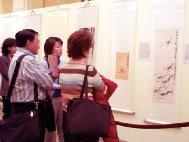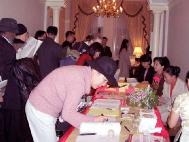(Clearwisdom.net)
A special art exhibition entitled "Genuine Traditional Chinese Painting & Calligraphy by 19th & 20th Century Masters" was held from October 21 to 24, 2004, at the Waldorf Astoria Hotel on Fifth Avenue in Manhattan. A collection of priceless masterpieces was exhibited free of charge to the public. The exhibited artwork included masterpieces by Chinese traditional painters Mr. Wu Changshuo, Mr. Qi Baishi and Mr. Huang Binghong. There were also paintings by Chinese painters Mr. Xu Beihong, Mr. Zhang Daqian and Mr. Li Keran, who embraced western art forms. Scholarly painters such as Mr. Fu Baoshi and Mr. Pan Tianshou were also exhibitors.
The works displayed the artists' great attainment in art and high moral standards.
About 1,000 visitors came to the exhibition in an endless steam every day, quietly lining up in the entrance corridor of the exhibition hall and waiting patiently for the opportunity to look at these rarely seen original artworks. Besides Chinese visitors, many artists, connoisseurs, renowned western and eastern scholars, and experts on traditional Chinese painting came to the exhibit.
On October 24, Mr. Zeng Shanqing, an elderly man who had been a student of the renowned Chinese painter Mr. Xu Beihong, came to the exhibition. When he saw the painting "A Horse Looking Back" by Mr. Xu Beihong, he told the guide that this painting was one of the highest quality paintings by the artist during his lifetime.
Traditional Chinese painting focuses on conveying feelings or ideas. Whether a painter can produce, with a simple piece of rice paper and a bottle of ink, a refined and valuable artwork that transcends the worldly realm, depends not only on his skill and ability to express feeling with each stroke, but also on his moral standard and character.
 The guide talks about the famous painter Mr. Qi Baishi and his granddaughter Qi Bingshu |
During the tour, the guide told the audience about Mr. Qi Baishi, one of the most famous Chinese painters and a person of moral courage. He valued benevolence and righteousness. During the War of Resistance against Japan (1937-1945, World War II), he posted a note on his front door saying, "Qi Baishi is dead" to stop the Japanese and those who assisted the Japanese in the invasion of China from asking for his paintings. In a painting of a crab that was given to a Chinese assistant of the Japanese, he wrote, "See how long you can tyrannize." In another painting of a "tumbler," he wrote the following poem:
"Wearing black gauze and holding a white fan,
but still acting as an overlord.
Never tumbling down as you are just a handful of mud.
Suddenly break you open,
and nowhere can I find a heart in you."
Mr. Xu Beihong, another famous Chinese painter, lived a simple and hard-working life from childhood. He was honest and upright and always respected others. He invited Mr. Qi Baishi to visit him three times and painted horses for him in exchange for letting Ms. Fu Baoshi pursue advanced painting studies in Japan. In the circle of painters, he was called "Bole," which refers to an ancient person extremely good at discovering winged steeds, now synonymous with people who are good at spotting others with talent. A master of painting, he had a reputation for chivalry and benevolence. Mr. Li Keran, a student of Mr. Qi Baishi, was renowned for his paintings of bulls. He valued a person's character. During the Cultural Revolution, he was regarded as a "reactionary authority" and imprisoned in a cowshed. Like many other intellectuals at that time, he was forced to raise livestock and was deprived of his right to do research or other intellectual work. In such difficult circumstances, he still tried his best to protect and help those less fortunate than he.
In a painting of shrimp by Mr. Qi Baishi (1864-1957), they are depicted so carefully and in such detail that the shrimp, not commonly the subject for a painting, appear alive and full of energy and strength. The painting combines the fun of folk art and the refined tastes of scholars. In the painting "A Horse Looking Back" by Mr. Xu Beihong (1895-1953), the horse stops suddenly mid-gallop and listens quietly. The painting is bold and straightforward, with a harmonious mix of movement and stillness. The enthusiasm and liveliness of the alert steed were so perfectly expressed that we could feel its life and hear its breath. In the steep mountains painted by Mr. Fu Baoshi (1904-1965), a waterfall filled the picture with buoyant spirit. Four scholars in white gowns calmly view the scene with only their backs visible, creating a contrast of stillness and motion The bright waterfall is shown in the shadow of black mountains reaching as high as the sky and to depths unknown, to contrast large and small. Many people were struck by the painting and sighed in front of the work, "The sky is as high as seventy thousand feet, and I am less than seven feet tall. Who in the world could ever control his destiny?" Mr. Fu condensed this profound understanding into one small scroll.
 Visitors are writing down their comments |
A Chinese immigrant came out of the exhibition hall content yet concerned. She said, "I haven't seen such excellent Chinese paintings for so many years. It's such a rare luxury for the mind. Chinese people always talk about patriotism, but many of them don't know what the essence of Chinese civilization is. The patriotic propaganda in China is no more than frantic politics which encourages ignorance and spiritual violence." She added, "An exhibition of such a high quality truly enriches people's minds and favorably influences people's sentiments. It validates the artistic concept and helps me understand why Chinese traditional artists all emphasize moral standards and moral courage."
There were more than 100 masterpieces by more than sixty of China's most influential and revolutionary artists from the end of the Qing Dynasty through the beginning of the Republic of China and up to the1960's. With limited space, only about 30 paintings could be displayed without the protection of thermostats or glass cabinets.
The audience listening to Ms. Qi Bingshu's experiences sighed. Some burst into tears. They all expressed their concern for Ms. Qi's safety. Many accepted the rescue postcards and expressed their intention to help rescue Ms. Qi.
Ms. Zhao, one of the visitors to the exhibition, couldn't stop her tears. She said, "I am very fortunate to have the opportunity to view these valuable artworks by master artists. If I were in China, I couldn't possibly have seen this remarkable work. When I heard about Mr. Qi Baishi's granddaughter, descendent of such a famous artist, suffering inhumane torture for cultivating Falun Gong, I couldn't believe my ears. We should protect the descendents of such famous artists, not persecute them. I have heard of Falun Gong. Everyone should have the right to choose his or her belief."





